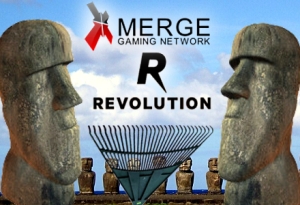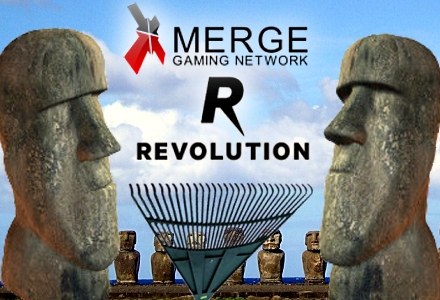 Revolution Gaming, the new online poker network formed when Lock Poker acquired selected assets of the Cake Poker Network, has unveiled a new .eu splash page ahead of its scheduled June 1 launch. The site marks the debut of the new Revolution logo (a stylized ‘R’ which, as @pokerfuse pointed out, bears a passing resemblance to Rockstar Games’ logo). Frankly, we think a more apt logo would be a giant R stamped on one of those stone heads that dot Easter Island. Just as the former inhabitants of that now depopulated rock embarked on a misguided strategy of cutting down all the trees until there was no more wood with which to make boats with which to go fishing with which to sustain their very existence, Revolution has embarked on a similarly misguided strategy of attempting to build market share by offering overly generous rakeback to poker players.
Revolution Gaming, the new online poker network formed when Lock Poker acquired selected assets of the Cake Poker Network, has unveiled a new .eu splash page ahead of its scheduled June 1 launch. The site marks the debut of the new Revolution logo (a stylized ‘R’ which, as @pokerfuse pointed out, bears a passing resemblance to Rockstar Games’ logo). Frankly, we think a more apt logo would be a giant R stamped on one of those stone heads that dot Easter Island. Just as the former inhabitants of that now depopulated rock embarked on a misguided strategy of cutting down all the trees until there was no more wood with which to make boats with which to go fishing with which to sustain their very existence, Revolution has embarked on a similarly misguided strategy of attempting to build market share by offering overly generous rakeback to poker players.
We first got a hint of the Revolution strategy when Cake Poker announced it would boost its top rakeback rate from 33% to 36%. To counter this and to compensate for the loss of former skin Lock Poker, the Merge Gaming Network has announced it will reinstate its own 35% rakeback scheme, exactly one year after it folded its rakeback program. Back to the future? Maybe social gamers Zynga aren’t the only poker company out there that’s considered “creatively bankrupt?” Perhaps that’s unfair. After all, Merge is planning to introduce a redesigned lobby next month, which will soon be teeming with hundreds of players all refusing to play each other because they’re not obvious fish.
SLAVE TO THE GRINDERS
At the risk of stating the obvious, rakeback is designed to appeal to a specific type of poker player: the multi-table grinder who generates lots of rake. The short-term benefits these (generally) winning players provide poker rooms are ultimately negated by the fact that these are net-withdrawing players who prey upon net-depositing players. This latter group is the lifeblood of the poker ecosystem, a steady resupply of which is required to sustain this business. Yet smallish poker rooms still view the net-withdrawers as their prize pigs, and are prepared to go to great lengths to attract and hold these players rather than encourage new players that the water in the pool is warm and inviting.
A common refrain uttered by actors and musicians who have made it big is that they suddenly no longer have to pay for anything. When they were starving artists and could have used some help, they had to pay for goods and services like everybody else. But now that they can easily afford to pay their own way, companies are bending over backward to give them stuff (and to be seen to be giving them stuff). The money that rakeback-friendly poker rooms kick back to winning players is money that can’t be used on promotions designed to attract the ‘right’ type of player (net-depositing). It also depletes these companies’ R&D budgets (assuming they have heard of such a beast), ensuring the innovation stagnation that currently plagues the industry.
SALUTE YOUR SOLUTION?
The Bodog Network is an example of a company that has adopted a polar opposite approach to that taken by the likes of Merge and Revolution. Bodog has tried to attract recreational players by taking steps – such as introducing anonymous tables and banning the use of digital aids like poker tracking software – to ensure these noobs receive (at the very least) a less savage mauling at the digital tables. Since he’s been so vocal on this subject, we asked Bodog’s Jonas Ödman for his thoughts on the renewal of the rakeback wars. “It definitely shows a lack of creativity to think that 1% higher rakeback than your competitor would be the solution to poker marketing. All they’re doing is rewarding the wrong type of players and cutting their own margins at the same time.”
With networks like Revolution and Merge placing a renewed focus on catering to the needs of a privileged few rather than the good of the whole, it’s small wonder that 50% of new players never make a second deposit because their initial experience was so abrupt, uneven and (ultimately) unsatisfying. The downturn that had already plagued the online poker industry long before Black Friday was in part caused by a lack of awareness of the need to attract and hold new net-depositing players. Are those who forget history indeed doomed to repeat it? Either way, it will make an interesting postmortem in a few years to see which of these approaches proved correct – assuming, of course, that all the above mentioned poker outfits are still going concerns.
